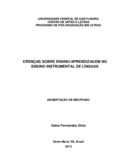| dc.creator | Diniz, Deize Fernandes | |
| dc.date.accessioned | 2012-11-20 | |
| dc.date.available | 2012-11-20 | |
| dc.date.issued | 2012-03-06 | |
| dc.identifier.citation | DINIZ, Deize Fernandes. BELIEFS ON LEARNING/TEACHING IN SPECIFIC LANGUAGE
TEACHING. 2012. 162 f. Dissertação (Mestrado em Letras) - Universidade Federal de Santa Maria, Santa Maria, 2012. | por |
| dc.identifier.uri | http://repositorio.ufsm.br/handle/1/9872 | |
| dc.description.abstract | The beliefs that involve the language learning/teaching process are made up
through experiences of each individual and they reflect the personal views about
learning an FL. By assuming that each person has their particular beliefs, this work aims
to verify if those may change from the type of education received. The information
needed to perform this research was obtained through questionnaires, semi-structured
interviews and observations in the classroom. We based the theoretical approach on
Barcelos (2010; 2007; 2004a; 2004b; 2003; 2001; 1995), who work with beliefs. Ramos
(2005) served as a basis on specific language learning and Vygotsky (2001; 1998;
1978) on the socio interactionism view of language. It is quali-quantitative research done
with 76 students/professionals from the course Curso de Capacitação em Português
Língua Estrangeira Instrumental para Agentes do Governo Uruguaio: Polícia
Rodoviária, offered by the Centro de Ensino e Pesquisa de Línguas Estrangeiras
Instrumentais (CEPESLI), from Federal University of Santa Maria. Some of the beliefs
brought by the group were: being an adult does not interfere in FL learning; learning
Portuguese is easy; it is possible to learn it without needing to study; a learning directed
to the student s occupation is sufficient to communicate at work. After the identification
and comparison of these beliefs and the data analysis it was possible to conclude that
the beliefs of the students may change even at different extents from learning/teaching
experiences with an intensive and communicative learning language approach. | eng |
| dc.description.sponsorship | Coordenação de Aperfeiçoamento de Pessoal de Nível Superior | |
| dc.format | application/pdf | por |
| dc.language | por | por |
| dc.publisher | Universidade Federal de Santa Maria | por |
| dc.rights | Acesso Aberto | por |
| dc.subject | Ensino de línguas estrangeiras instrumentais | por |
| dc.subject | Crenças | por |
| dc.subject | Ensino/aprendizagem | por |
| dc.subject | Specific language teaching | eng |
| dc.subject | Beliefs | eng |
| dc.subject | Learning/teaching | eng |
| dc.title | Crenças sobre ensino/aprendizagem no ensino instrumental de línguas | por |
| dc.title.alternative | Beliefs on learning/teaching in specific language
teaching | eng |
| dc.type | Dissertação | por |
| dc.description.resumo | As crenças que envolvem o processo de ensino/aprendizagem de línguas são
constituídas através das experiências de vida de cada indivíduo e refletem as posições
pessoais sobre a aprendizagem de uma LE. Este trabalho, assumindo que cada pessoa
possui suas crenças particulares, teve como objetivo verificar se tais crenças podem vir
a sofrer alterações a partir do tipo de ensino recebido. As informações necessárias à
realização da pesquisa foram obtidas através de questionários, entrevistas
semiestruturadas e observações realizadas em sala de aula. Serviram de base teórica
trabalhos de autores como Barcelos (2010; 2007; 2004a; 2004b; 2003; 2001; 1995), na
área de crenças. Ramos (2005) serviu de suporte teórico sobre o ensino instrumental
de línguas e Vygotsky (2001; 1998; 1978) nos embasou nos propósitos
sociointeracionistas da linguagem. A orientação metodológica foi de uma pesquisa
quali-quantitativa, realizada com 75 alunos/profissionais do Curso de Capacitação em
Português Língua Estrangeira Instrumental para Agentes do Governo Uruguaio: Polícia
Rodoviária, oferecido pelo Centro de Ensino e Pesquisa de Línguas Estrangeiras
Instrumentais (CEPESLI), da Universidade Federal de Santa Maria. Algumas das
crenças trazidas pelo grupo foram: ser adulto não influencia na aprendizagem de uma
LE; aprender português é fácil; é possível aprendê-lo sem a necessidade de estudo; o
ensino voltado à profissão do aluno é suficiente para a comunicação em situações de
trabalho. Após a identificação e comparação dessas crenças e da análise de todos os
dados de nosso corpus foi possível concluir que as crenças dos alunos/policiais podem
sofrer alterações, mesmo que em diferentes medidas, a partir da experiência de
ensino/aprendizagem com a abordagem instrumental, intensiva e comunicativa de
ensino de línguas. | por |
| dc.contributor.advisor1 | Marchesan, Maria Tereza Nunes | |
| dc.contributor.advisor1Lattes | http://buscatextual.cnpq.br/buscatextual/visualizacv.do?id=K4794805Y6 | por |
| dc.contributor.referee1 | Mendoza-sassi, Maria Pia | |
| dc.contributor.referee1Lattes | http://lattes.cnpq.br/3902701107193137 | por |
| dc.contributor.referee2 | Leão, Rosaura Maria Albuquerque | |
| dc.contributor.referee2Lattes | http://buscatextual.cnpq.br/buscatextual/visualizacv.do?id=K4782242J0 | por |
| dc.creator.Lattes | http://lattes.cnpq.br/4062420966736436 | por |
| dc.publisher.country | BR | por |
| dc.publisher.department | Letras | por |
| dc.publisher.initials | UFSM | por |
| dc.publisher.program | Programa de Pós-Graduação em Letras | por |
| dc.subject.cnpq | CNPQ::LINGUISTICA, LETRAS E ARTES::LETRAS | por |


